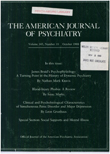Informed consent as a form of volunteer bias
Abstract
Two nontreatment studies of tardive dyskinesia were examined to see if giving or refusing informed consent might bias results. Three prominent psychiatric journals were also reviewed to determine whether the outcome of informed consent procedures was sufficiently well described to permit evaluation of potential bias. The nontreatment studies suggested that the bias created by requiring informed consent may cause both false-positive and false-negative findings. The literature review showed that treatment studies have generally ignored the potential impact of these biases on results. Accurate interpretation of research reports, particularly clinical trials, demands that more attention be given to the process of obtaining and reporting informed consent.
Access content
To read the fulltext, please use one of the options below to sign in or purchase access.- Personal login
- Institutional Login
- Sign in via OpenAthens
- Register for access
-
Please login/register if you wish to pair your device and check access availability.
Not a subscriber?
PsychiatryOnline subscription options offer access to the DSM-5 library, books, journals, CME, and patient resources. This all-in-one virtual library provides psychiatrists and mental health professionals with key resources for diagnosis, treatment, research, and professional development.
Need more help? PsychiatryOnline Customer Service may be reached by emailing [email protected] or by calling 800-368-5777 (in the U.S.) or 703-907-7322 (outside the U.S.).



